- Home
- Ian Wallace
The World Asunder
The World Asunder Read online
The
World
Asunder
Ian Wallace
COPYRIGHT ©, 1976, BY IAN WALLACE
All Rights Reserved.
Cover art by Jack Gaughan.
FIRST PRINTING, NOVEMBER 1976
1 2 3 4 5 6 7 8 9
PRINTED IN U.S.A
Novels by Ian Wallace (with dates of eras)
Adventures of Minds-in-Bodies:
EVERY CRAZY WIND (1948)
THE WORLD ASUNDER (1952 and other eras) PAN SAGITTARIUS (2509 and prior eras)
The Croyd Spacetime Maneuvers:
CROYD (2496)
DR. ORPHEUS (2502)
A VOYAGE TO DARI (2506)
The St. Cyr Interplanetary Detective Mysteries:
THE PURLOINED PRINCE (2470)
DEATHSTAR VOYAGE (2475)
THE SIGN OF THE MUTE MEDUSA (2480)
Dedicated Conjointly to
CARL JUNG, D. H. LAWRENCE,
and
ALFRED NORTH WHITEHEAD
Order of Business
AUTHOR’S FOREWORD
PROLOG
Part One -JUNE 1952
Part Two - JUNE 2002
Part Three - JUNE 1952
Part Four - JUNE 2002
Part Five - INTERTIME
Part Six - SPACE
Part Seven - 1952, AND SOME OTHER ERAS
Part Eight FRAGMENTATION OF EARTH
EPILOG
Kali. (Hinduism) A goddess personifying creation and destruction...
—The Random House Dictionary
of the English Language, 1966
“. . . The deity (Kali) is portrayed ... by a black figure with gaping mouth and protruding tongue, adorned with snakes and dancing upon a corpse; her earrings are dead men, ha necklace is a string of skulls, her face and breasts are smeared with blood. For Kali-Parvati is the goddess of motherhood as well as the bride of destruction and death ...”
— Will Durant, Our Oriental Heritage Page 509
AUTHOR’S FOREWORD
How does the author classify The World Asunder?
Perhaps, from several viewpoints it is science fantasy. The partial science called psychology is extrapolated from, there is intertime-play with some time-speculation, and the tale often turns on techniques which are moderately or extravagantly futuristic in their elaboration yet which, for the most part, are budding or beginning to bloom in our time.
Perhaps it is a detective mystery (but without a murder). In the tale, a good deal of attention is given to responsible mental flounderings in search of solution to an enigma which transcends ordinary reason, and one of the two leading men is a detective.
Or, does it have elements of itinerant romance? For sure, the story savors the route as much as it savors the destination, and pleasantries of geographical and intersexual exploration and local color take more space than a late-on space-time foray does.
Could it also be a novel of diplomatic intrigue, in view of the REM Device and RP deftnesses and Kali machinations, with international rivalries a lethally major concern?
Or could it be a meditative morality play, having psychotheological implications, with mental fantasies and time-space-body changes-and-materializations in place of conventional gods and demons and monsters, and with a satanic force obscurely in the background?
Any such classification would be to assign The World Asunder to some limited genre. In the author’s mind, it is just this novel utilizing this kind of scope; and in the process, the author’s main concerns are Dio, Lilith, Rourke, Esther, the RP Fleet, and the soul-nature of Kali.
Two considerations should be made explicit. One is the responses of different kinds of intelligent people confronted by absolutely impossible situations. On page 124, Rourke Mallory says, “I respect every instance of Man performing at the highest ability-level that he can possibly evoke.” The other is the degree to which a human mind may be split into two totally unrelated minds. I have gone quite a distance in the development of each of these two considerations, exaggerating the latter into an actual materialization.
If some aspects of the story strike some as being male-chauvinistic, I have no apology: no propaganda is intended —these are these men and these women. And nowhere is any ethnic satire intended, herein or anywhere in my life and work: my abiding concern is with human universality deliciously enhanced by its individual and cultural variations.
I have never met or known of anybody anywhere any-when having the name, appearance, personality, or situational complications of any character in The World Asunder. All are completely author-fictions, as are Pic Dentelé and Mont Veillac.
The twice-appearing line “Oh, God, no,” is out of James Branch Cabell’s Figures of Earth. If the word “hell” keeps ’ creeping in, it is probably appropriate; one notes an equal frequency of “blessed.”
Ian Wallace Western North Carolina, 1975
PROLOG
My wife Lilith Vogel Glazer was inadvertently shot dead by a young fanatic in 1975. Twelve years later, kicked upstairs to the status of rabbi emeritus of our temple, I departed American shores for study and travel. My flagging energies in 1992 led me to settle finally in a small apartment in southern Spain, for rest and meditation in the land where Maimonides and Spinoza labored and meditated. Nearby nuns take good care of me.
One outcome of my own meditation was my decision to publish this frank memoir by Lilith. Our children and I have agreed on this, knowing that most of her contemporaries and mine are now either objective enough to read it without malice, or weak enough not to read it, or dead enough not to care; a generation ago, many of them would have been scandalized by its mix of modes: realism and outrageous fantasy and humor and intensely personal candor.
Lil wrote it for my private perusal, after we’d been married about five years and Lil was thirty-six while I was forty-four. I'll get to the circumstances of the writing in a moment; but first I should tell you a bit about Lilith.
Her German Lutheran father, appreciating that his own surname Vogel would belong to his daughter perforce, graciously allowed her German Jewish mother to choose her given name; and her mother, whose humor could be as rich as her tenderness, named her Lilith; so of course she became Lil Vogel except among those who were discerning enough to appreciate Lilith.
She loved her parents as happily-intensely as they loved her and each other, and laughed with them deliciously, and honored their intellectually liberal raising of her. She became a clinical psychologist, which is not unusual for Jews who honor deep study and grasp enough of their heritage to become soul-conscious; but somehow she missed becoming either introspective or paranoid, maybe because her parents so loved each other and were so merry-warm. The parents died together in an Allegheny Mountains plane crash in 1945, he at fifty, she at forty-six. Mourning but all business, Lilith had them both embalmed because that would pleasantly shock her Jew-respecting father while amusing her liberal mother, and saw to it that their funeral service was partly Low-Church Lutheran and partly reformed Jewish, and buried both of them together in a reformed Jewish cemetery because her religiously social mother would have preferred it while her resurrection-minded father wouldn’t have cared.
The central time-scene of this memoir is seven years later, in 1952, although there are broad sweepings into other eras past and future.
Subsequent to the events of this memoir, and after a decade of psychological practice, at thirty-one Lilith found and married a nice Jewish boy: me. I was thirty-nine and the rabbi of a small reformed temple. Earth’s population problems being what they were, we agreed on having just two children; but we had them fast, our ages being what they were, and the first was a girl, whom we named Rebecca, and the second a boy, whom we named David.
(Better, we opined as a matter of team-taste, than Sheila and Irving.) Lightly I suggested that, being between us one-quarter Gentile, we should have two more and name them Joseph and Mary; but Lilith took it lightly, blessèd be He and she!
We had married mutually open-eyed: each of us knew that the other had known a few other-sex types; so fine; the big thing for both of us was, no serious consequences overhanging, and we loved each other enough to marry and stay that way. Sure, one of hers had been a heartbreak and a more recent one had been a soul-expanding-and-curdling powerhouse (both appear in the memoir), and a couple of mine had been mighty potent women; okay, great, that makes for maturity going in.
We wouldn’t have gotten into intent discussion about any of that, except for a thing. One day when the kids were two and three years old, Lilith was playing with them, and all of a sudden she had a thought and got Jewish-mother panicky although she hid it Later that evening, she asked, “Ben—what is Satan?”
I pipe-puffed; then: “Some call him Lucifer and some Sathanas; and there is evidence that the idea may have originated with the Egyptian god Set, who, by the way, was as much Great and Good Friend as he was Adversary—”
“Shut up, I know all that Tell me what he is.”
Knowing that she was serious, I laid down my own copy of Gustave Glotz’s The Aegean Civilization and studied her carefully. “Speaking as a theologian,” I remarked, “I don’t think I can tell you a thing you haven’t theorized yourself. Speaking as a semi-psychologist, I know I can’t Now tell me why you ask.”
She blurted, “I may have known one of his avatars. And I worry about the kids.”
“Why the kids?"
“If I’m right about this, Ben, I think that Satan is a personification of compulsive paranoid wildness when it separates itself from all the balancing soul-ingredients. And some of that is in all of us.”
“So?” I wasn’t baiting, I was waiting.
“If I’m right Satan would be potentially universal, wouldn’t he? For all people—in all eras?”
I probed, “You said you thought you’d known him once. Want to talk about that?”
She thought about the possibility. She was terrified by one memory-assessment: his sense of humor had been sardonic, complicated, cosmic....
Presently she frowned. “It would be awfully complex for talking. I—think I’d better try to write it out Would you read it?’
“With great care,” I assured her; and I meant it Then I leaned forward in my chair toward her in her facing chair, and I took her wrist “Go ahead and write it Lilith. Don’t be afraid if you personify Satan. It’s fashionable among rationalists to scoff at personified evil—but it just may be that they haven’t stated the problem right. Only, Lil— don’t hurry the writing, do bits of it when you’ve nothing better to do. Anything compulsive might—call up Satan, if your analysis is right.”
She gazed at me soberly. “Please, Rabbi, pray for our kids. Pray for all kids.”
Just as soberly, I nodded. Then I grinned: “Assez do Glotz et Sathanas—un peu de gin rummy.”
I saw no fragments. Two years later, she brought me the full manuscript Despite the scrawl (well known to me) and the interlinings (frequent), I skimmed through all of it that night then reread it twice during a three-week period, before I commented. Never mind our discussions: they were comprehensive, comprehending, and loving.
By mutual agreement we then forgot it for a decade. By the time the decade was out, I had forgotten it completely, except dining an occasional reverie when the memory never quite sparked me to unearth it.
In 1975, when the kids were nineteen and twenty, a paranoid youngster in our big-city temple jumped up while I was reading Scripture and yelled something about “Accursed myth-huckster for the Establishment!” and aimed a pistol at me. By chance, Lil sat two rows in front of him and in his line of fire; and she leaped to her feet and turned and spread her arms just as he triggered. She took my bullet between her eyes.
Hours later, dying, she uttered, “Ben—publish the memoir.”
It has taken me two decades to make up my mind. But I keep brooding over the disasters of this century: two world wars, Nazism and Jew-genocide, cold-core Communism, Korea, Mid-East intra-Semitic confrontation with both sides equally right and wrong, Vietnam, mindless youth-rebellion, dope-pushing, mindless white-black polarization with extremisms hotting-up both sides, rising crime which is often intrafamilial, even the insanity of inflation during economic recession. . . . Having been away from the United States most of the time since 1987, I’ve somewhat lost track of local developments there; but when I left, it seemed to me that we were still a long way from the settling-in of new order.
What keeps nagging at me is that when you analyze the men and women or the guys and chicks who power and steer all the extremisms local, national, international, interreligious, interwhatever, you keep finding the same personality-dynamic: compulsive-wild paranoid egotism self-separated from all balancing soul-ingredients, regardless how suave and charismatic the operator may be. And that was Lil’s formula for Satan.
Lil didn’t put the following into her memoir, perhaps because she didn’t want to (using her idiom) louse it up with moralizing; so I will say it for her right here, speaking to atheists and agnostics as well as to people of diversified religions. Stay with your god or your dream, whoever he or she or it may be; and helpfully hold hands with people.
My Lilith lived and spoke and wrote with gusto, with intelligence, with deep human feeling disguised by the appearance of a casual toss-off approach. She lived fully, and her 1952 memoir to me was candid about this, and I pass it along to every reader without editing. If Satan is what Lilith thought he is, then Lilith was able to stay clean of him— and yet she knew him, deeply and perceptively; and she knew the often subtle difference between those who have been touched but not captivated by him and those who have allowed him to master them.
My wife chose to write her memoir in straight chronological order, although this necessitated some inter-era alternations. Consequently it thinks and talks and travels and moves through a series of illusions while quest-intensity mounts; but the slowly drawn bowstring doesn’t twang until past midstory. A reader who hasn’t taken time to comprehend the string-draw won’t get full value out of the twang.
Her memoir my personal bias finds to be a good story. Credulity is sometimes strained by time-shifts and materializations and mind-blowing technology; yet, science being still the uncertain science that it is, I have to accept her honest report of her own experience. Meanwhile, my objective judgment is that certain underlying universalities in the memoir require to be exhibited for meditation. If necessarily there are some self-unveilings, the focus of these is never egotistically Lilith herself; rather, she is always being a responsive medium for self-revelation by somebody else. May she bless me for finally publishing.
Benjamin Glazer
Málaga, 1994
Part One
JUNE 1952
America’s insistence on fighting a no-win war in Korea is many-ways ironical. I will name three ways. First, it is a limited war because America wishes to avoid involving China, and therefore Russia, which may attack with atomic bombs; but in fact, Russia has only the beginnings of atomic bombs with no massive means of delivering them for several years at least; and meanwhile Russia so fears China that Russia would welcome an American-Chinese imbroglio and would stand passively-gleefully by. Second, though no Amer-can even in high places seems to be noticing this, we are on the verge of perfecting a hydrogen bomb which will make mere atom bombs look like containable block-busters. Third, precisely the prolongation of a no-win war is not only multiplying misery for both sides but is even intensifying the world’s polarity, so that the ultimate explosion will be all the more terrible.
And this is only 1952, with technology racing ahead so fast that today’s ten-year advance equals prior advances during half a thousand years! We need to wipe out this local complication quickly, a
nd start working in a long-range way against infinitely more terrible potentials fifty years from now —if we live so long.
—Neocassandra in The Progressive Conservative, 1952
1.
You can carry a torch for a man just about so long, and then you have to face reality and kiss off his image. This I did; and afterward, the doctoral work in psychology proceeded just fine, and temperately I managed enough selective and transient love-life to distract me from that particular man-image and keep my gonads quiet for serious work. Degree-equipped, I eschewed several institutional offers (I’d done time in the very best of all such institutions, and my now-quenched torch had been kindled there) and invaded Manhattan to open a private practice as a personal consultant. With pride, in my semi-seedy corridor, I studied my new gold-leaf door-sign: lilith vogel, Ph.D. But I was realistic enough to forget the sign and start subtly drumming up business.
Ben, you are witnessing the start of a hell of an experience.
Before long, somehow I became involved in police consultation: it was a sustainer, and devilish interesting. That was how I happened to meet Detective-Inspector Diodoro Horse; and before long we were Dio and Lil in private, although strictly on a congenial business-acquaintance basis. Dio was a swarthy little Arizona Indian crowding forty— he’d come up fast on brains, grit, fortitude, and interminable hours; his face was as thin-wiry as his figure, his eyes were a mite too close together, his personality was high-voltage, and his small mouth had buck teeth which he kept sheathing with his thin lips but which broke hard-out of those lips in moments of arousal or amusement. He was married to a religiously unafilliated Jew-by-birth named Esther, they lived childless not far from my office in a second-floor apartment; and it was a matter of interest to Dio that Esther and I faintly resembled each other. She was under thirty. Once I pressed him for details of our resemblances and differences, and it interested me that this detective with a photographic memory and trained in facial description was vague about Esther’s appearance. He could say that like me she was no taller than he and rather dark and “not bad, not bad at all”; but it seemed that her eyes were a bit closer together than mine (which are a silly little millimeter too far apart), and her mouth a bit smaller and fuller than mine and not quite so easily grinnable but (how would he know?) capable of being more passionate....

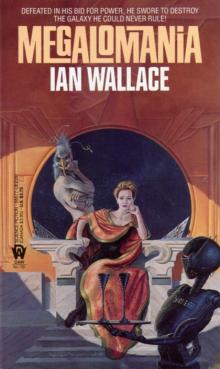 Megalomania
Megalomania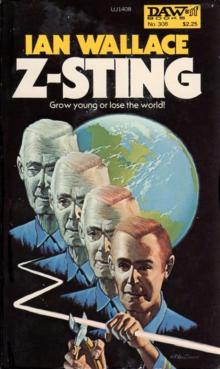 Z-Sting (2475 CE)
Z-Sting (2475 CE)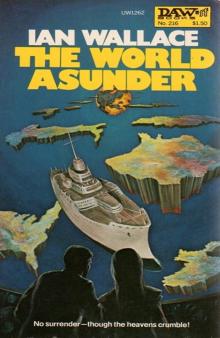 The World Asunder
The World Asunder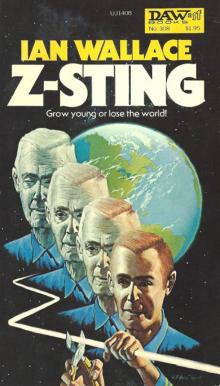 Z-Sting
Z-Sting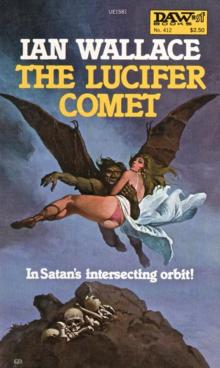 Lucifer Comet (2464 CE)
Lucifer Comet (2464 CE)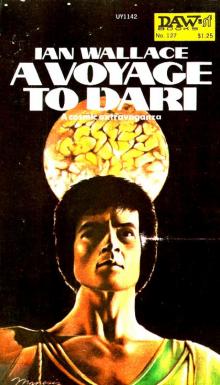 A Voyage To Dari
A Voyage To Dari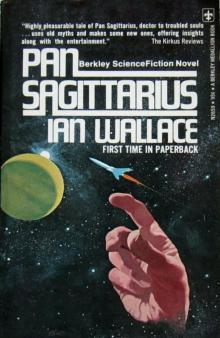 Pan Sagittarius (2509 CE)
Pan Sagittarius (2509 CE)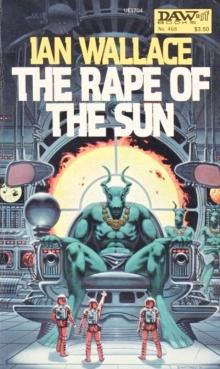 The Rape of The Sun
The Rape of The Sun